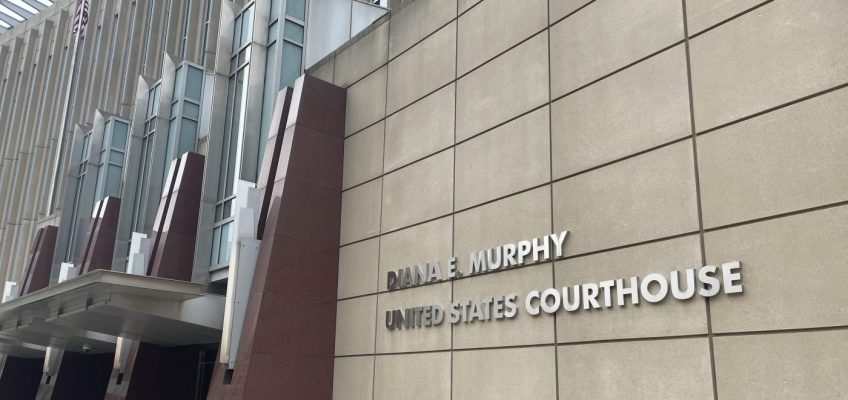New York counties thought they had months to prepare to implement SNAP work requirements. Now, they have weeks.
New York could be forced to enforce SNAP work requirements in a matter of weeks. (Illustration by Leor Stylar)
This story originally appeared in New York Focus, a nonprofit news publication investigating power in New York. Sign up for their newsletter here.
A surprise move by the Trump administration could result in hundreds of thousands of New Yorkers losing their food assistance benefits as soon as November—disrupting one of the country’s oldest safety net programs months earlier than expected.
In July, President Donald Trump signed his “Big, Beautiful Bill” into law, enacting over $1 trillion in cuts to Medicaid and the Supplemental Nutrition Assistance Program (SNAP, also known as food stamps). Drastic changes to SNAP were expected to roll out starting next year, including expanded work requirements projected to cause hundreds of thousands of New Yorkers to lose eligibility.
On Oct. 3, the federal agency that oversees SNAP announced it would hasten that timeline by terminating waivers that have allowed dozens of states, including New York, to largely suspend work requirements. Those requirements limit recipients to three months of SNAP benefits over a three-year period, unless they continually certify they have worked, volunteered, or studied in school at least 80 hours per month.
New York’s waiver was set to expire at the end of February, allowing officials to delay the implementation of work rules until March; it is now set to be cancelled in the first few days of November. That means New York could be forced to enforce work requirements in a matter of weeks.
Research shows work requirements do little to raise employment rates and often result in eligible recipients losing their benefits due to paperwork errors, processing delays, and the time it takes to gather and submit the right documentation.
They also significantly expand the workloads of the agencies responsible for reviewing that paperwork. In New York, the task of verifying eligibility and administering SNAP benefits falls to already strained county social service departments. Those departments, which thought they had months to prepare to implement work requirements, will now have to scramble to do so much earlier.
“I’m sitting with the managers and brainstorming what we can do to stay ahead of the storm,” said Kira Pospesel, commissioner of Greene County’s social services department in the Catskills. “Every idea is going to be on the table.”
Pospesel’s team had a conference call with state leadership on Wednesday to discuss training staff on the new rules, she said. Her agency is typically inundated this time of year with calls about heating assistance for the upcoming winter; it will now have to deal with those applications on top of the changes to SNAP.
Understaffing has long been an issue across county social service departments, forcing many agencies to make do with limited resources. “Not a lot of people want these jobs, at least here there’s ‘help wanted’ signs all over,” said Pospesel. “We’re going to give it our best try, but there are no guarantees.”
Phil Church, Oswego county administrator and president of the New York State Association of Counties, said his county’s social service department is already reassigning staff to work on the SNAP transition. Staff will also need to schedule hour-long orientations with nearly 900 SNAP recipients who will be subject to the new work requirements.
The state Office of Temporary and Disability Assistance told counties to begin enforcing work rules next month for “able-bodied” adults 18 to 54 years old without dependents under 18, Church said. Counties will then need to extend those rules—under the July law—to adults up to 64 without dependents under 14 when they renew their SNAP benefits.
“We’re going to have to have all hands on deck for this,” Church said of the new requirements. “It will hit us in additional hours and overtime we weren’t counting on.”
The county typically has about 15 staffers who work on SNAP administration, but Church said he anticipates 39 staffers will need to work on the program in order to meet the accelerated timeframe.
That will cost money—even as counties struggle to plan their budgets for the upcoming year amid a host of Trump-era cuts. The July law decreases federal funding for SNAP administrative costs and will require states to pay for a portion of the benefits paid out to recipients.
The abrupt announcement isn’t the only cloud on the horizon for SNAP recipients. If Congress fails to reach an agreement soon to reopen the government, funding for all SNAP recipients, as well as for those who receive WIC (Women, Infants, and Children) benefits, could also be suspended as soon as November.
RELATED READING: What the Federal Govt. Shutdown Means for Your Voucher & Benefits
The shutdown is set to go into its second week, with Democrats and Republicans deadlocked over health care funding and no deal in sight. The last shutdown, which was the longest in us history, lasted 35 days.
A prolonged shutdown could also derail the state’s food bank network, according to Ryan Healy, advocacy manager for Feeding New York State. Food banks across the state rely heavily on federal funding and food shipments, and received far less food than promised earlier this year as a result of other federal cuts. That’s despite rising food insecurity statewide, which has remained elevated since the onset of the pandemic.
Contents of a single microwavable food bag prepared for clients experiencing homelessness at St. John’s Bread & Life on June 24, 2025. (Adi Talwar/City Limits)
It could also become difficult to gauge exactly how bad food insecurity gets, Healy noted. A week before the government shutdown began, the Trump administration announced it would be eliminating an annual survey that has been conducted since the 1990s.
“When you’re looking to avoid accountability for your bad policy decisions, you stop collecting data,” Healy said. “It’s going to make it even harder to evaluate the magnitude of these unprecedented changes.”
Nearly 3 million New Yorkers are enrolled in SNAP, with the average household receiving $376 per month in benefits. Nearly half a million receive WIC, which provides food and other nutritional assistance to pregnant people, new mothers, and young children.
Officials at the state Department of Health, which manages WIC, and the Office of Temporary and Disability Assistance, which oversees SNAP, emphasized that benefits for both programs remain unaffected by the shutdown through the month of October.
“For the time being, WIC remains open and ready to serve families. Families should keep appointments and use benefits as usual,” a health department spokesperson wrote in an email. “As the federal landscape continues to change rapidly, we are closely monitoring any developments and will keep New Yorkers informed of any changes that would affect their benefits.”
Neither agency was able to provide additional detail about what will happen to benefits beyond October or how the state is preparing for potential losses in benefits coverage.
Diana Ramos, an activist with the Safety Net Project at the Urban Justice Project, called on Gov. Kathy Hochul and Albany lawmakers to take action at the state level to protect New Yorkers at risk of losing their benefits.
“We need to be the role models of this country and say New York state stepped up,” said Ramos, who supports proposals to raise taxes on the wealthy to backfill federal cuts. “I’d like to see the state offer funding.”
Ramos relies on SNAP benefits to feed herself and her dog in the Bronx. She said she’s worried about how the work requirements will affect recipients like her neighbor, a working single mother of three who may not have the resources or time to stay on top of additional paperwork to continually prove her eligibility.
The past year has seen one obstacle after another for many SNAP recipients. Like thousands of New Yorkers, Ramos has also been the victim of SNAP skimming. The entirety of her $292 in monthly benefits were stolen in June through a scam that targets the magnetic strip cards used to access SNAP benefits.
Despite being a hotbed for SNAP theft, New York has hesitated to implement more secure chip-enabled cards, as California did earlier this year. Stolen SNAP funds are no longer being reimbursed after talks in Congress to extend funding broke down late last year.
The post Surprise Trump Move Will Upend New York Food Stamps appeared first on City Limits.




